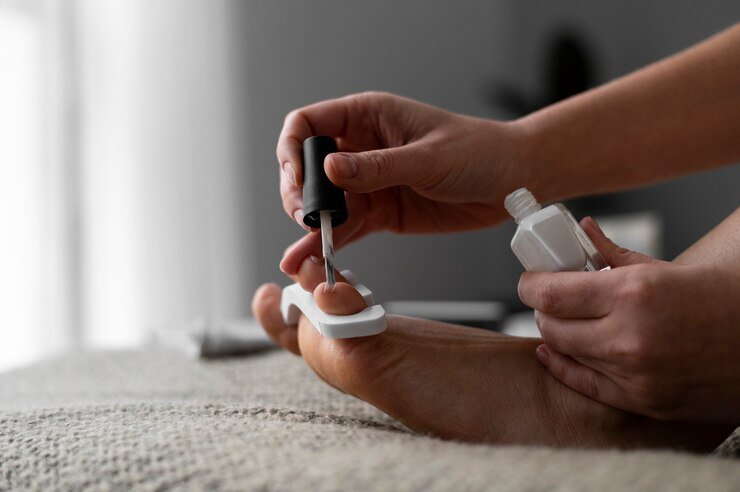Effective Diabetic Foot Care Services : Personalized Treatment for Quick Recovery


A Comprehensive Guide to Diabetic Foot Care
DIABETIC FOOT CARE SERVICES


WHAT IS DIABETES?
Diabetes is a chronic health condition that affects how your body turns food into energy. Glucose is a crucial source of energy for the cells in our body, and its levels are tightly controlled by the hormone insulin, which is produced by the pancreas. In individuals with diabetes, proper management is essential to prevent complications such as foot problems in diabetes, making timely intervention by a diabetic foot specialist in Kansas critical.
There are two main types of diabetes:
Type 1 Diabetes: This results from the immune system mistakenly attacking and destroying insulin-producing cells in the pancreas. People with Type 1 diabetes require insulin injections or an insulin pump to manage their blood sugar levels, which is crucial for maintaining Diabetic Foot Care in Kansas.
Type 2 Diabetes: This is more common and typically develops when the body becomes resistant to the effects of insulin, or when the pancreas doesn’t produce enough insulin. It is often associated with lifestyle factors such as obesity, lack of physical activity, and genetics. It may be managed with lifestyle changes, oral medications, and, in some cases, insulin, with regular monitoring and consultation with a diabetic foot specialist in Kansas to prevent complications.


WHY IS DIABETIC FOOT CARE IMPORTANT?
Proper Diabetic Foot Care in Wichita, Kansas is crucial for individuals managing diabetes due to the heightened risk of complications. At Foot & Ankle Surgeons of Wichita, Kansas, our diabetic foot specialists in Kansas focus on preventive care and early intervention to maintain foot health and minimize foot problems in diabetes.
Key Reasons for Diabetic Foot Care:
- Neuropathy Risk: Diabetes can cause nerve damage (neuropathy), especially in the feet. Neuropathy reduces sensation, making it harder for individuals to detect injuries or foot problems in diabetes. A diabetic foot specialist in Kansas emphasizes the importance of regular foot examinations to catch potential issues early and prevent complications.
- Circulation Concerns: Diabetes often affects circulation, reducing oxygen and nutrient flow to the feet. This impaired blood flow hinders healing, heightening the risk of infections and other complications. A diabetic foot specialist in Kansas monitors circulation and provides interventions to improve blood flow, reducing the likelihood of severe problems.
- Foot Ulcer Prevention: Diabetic patients are at higher risk for foot ulcers due to reduced sensation and delayed healing. A diabetic foot specialist in Kansas plays a vital role in educating individuals about proper foot hygiene, appropriate footwear, and preventative measures, minimizing the risk of ulcers and other complications.
- Customized Care: Diabetic Foot Care in Kansas isn’t one-size-fits-all. Diabetic foot specialists in Kansas create personalized care plans, offering solutions like custom orthotics or specially designed footwear to address each patient’s specific needs and challenges.
- Patient Education: Knowledge is power. Diabetic foot care in Kansas emphasizes educating patients on self-examinations, proper care, and the importance of timely medical intervention for any foot problems in diabetes.


Can Diabetes-Related Foot Problems Be Prevented?
Yes, taking proactive steps can significantly reduce the risk of foot complications related to diabetes. Here are essential measures to maintain healthy feet and minimize foot problems in diabetes:
- Control Your Blood Sugar Levels: This is the most important step for effective Diabetic Foot Care in Wichita, Kansas. High blood sugar levels can damage or destroy the nerves and blood vessels in your feet, leading to neuropathy, poor circulation, and dry skin.
- Maintain a Healthy Weight: Excess weight puts extra pressure on your feet, increasing the risk of foot problems in diabetes. Even a small amount of weight loss can reduce this risk and improve overall foot health.
- Get Regular Exercise: Exercise improves blood flow to your feet and strengthens them. Aim for at least 30 minutes of moderate-intensity activity most days of the week, under guidance from a diabetic foot specialist in wichita if needed.
- Wear Comfortable, Well-Fitting Shoes: Shoes that are too tight or too loose can cause blisters or sores, while shoes lacking support may lead to foot pain and discomfort. Choosing proper footwear is key in Diabetic Foot Care in Wichita.
- Regular Medical Check-Ups: Schedule check-ups with our team at Foot & Ankle Surgeons of Kansas. Our diabetic foot specialists in Wichita, Kansas can identify potential issues early and provide guidance on preventive measures to avoid foot problems in diabetes.


WHAT’S INCLUDED IN DIABETIC FOOT CARE?
- Daily Foot Inspection : Regularly examine your feet for any cuts, sores, blisters, redness, swelling, or other abnormalities. Early detection can lead to prompt treatment and prevent further complications.
- Proper Foot Hygiene: Wash your feet daily with mild soap and warm water, paying close attention to the spaces between your toes. Dry your feet thoroughly, especially between the toes, to prevent moisture buildup and fungal infections.
- Moisturizing: Keeping your feet moisturized helps prevent dryness, cracking, and the formation of calluses. Use a fragrance-free lotion or cream specifically designed for diabetic feet.
- Toenail Care: Trim your toenails straight across using sharp clippers. Avoid cutting them too short or rounding the corners, as this can increase the risk of ingrown toenails.
- Appropriate Footwear: Choose comfortable, well-fitting shoes that provide adequate support and cushioning. Avoid tight-fitting shoes, high heels, and shoes with open toes.
- Blood Sugar Control: Maintaining good blood sugar control is essential for overall diabetic foot care near you and reducing the risk of foot complications. Work with your healthcare provider to develop a personalized blood sugar management plan.
- Regular Foot Exams: Schedule regular foot examinations with your healthcare provider or a podiatrist. These exams allow for early detection of diabetic foot problems and prompt intervention.



